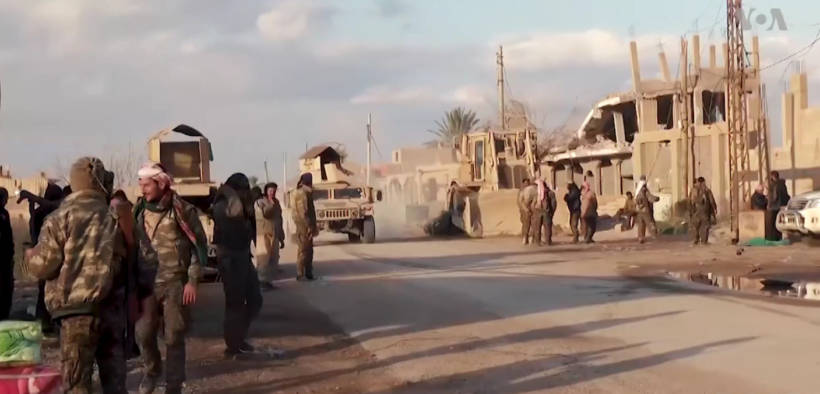Russia and Turkey Are Not The Only Perpetrators Of War Crimes in Syria

As foreign countries battle for their vested interests, innocent Syrians will continue to suffer.
Russia and Turkey have fueled war crimes in Syria, as an independent report from the United Nations (U.N.), -founded commission recently claimed. The statement came amid the competition between both nations in exerting their influence in the war-torn country.
The U.N. dossier blamed Russia, which supports Syrian’s incumbent leader Bashar Al-Assad, for an airstrike in Maarat al-Numan on July 22, 2019, that killed at least 43 civilians. The assault also destroyed residential buildings and 25 shops. The report covered attacks occurred during the July 2019-February 2020.
The U.N. independent commission also asked Turkey (which opposes the Assad regime and backs rebel groups) to investigate whether it was responsible for the airstrike targeting a civilian convoy near Ras al-Ain that killed 11 last October. Although the Syrian Observatory for Human Rights claims that a Turkish aircraft was behind the attack, Ankara denied the allegation.
Russia and Turkey are not the only ones to blame for the bloodshed in Syria, given that numerous countries have vested interest in the Middle East country. Foreign interventions have worsened the situation and the U.N. estimated in 2016 that the war had killed at least 400,000.
Syrian Civil War: A Brief Background
The war in Syria began in March 2011, when the Arab spring movement demanding an end of dictatorship swept throughout the Middle East. The uprising succeeded in ousting governments of Tunisia and Egypt at that time.
Bashar Al-Assad faced an unexpected mass rally demanding his resignation due to economic hardship, rampant corruption, and repressive government. Bashar replaced his late father, Hafez Al-Assad, who was in power from 1971 until his passing in 2000.
The peaceful mass rally turned violent when the Syrian government took a repressive act targeting protesters by detaining and killing them. The battle turned complicated as several defectors from the military set up a rebel group called the Free Syrian Army (FSA) aimed at overthrowing the Assad regime.
Foreign Interventions Complicate The Situation
The clash between Russia which has an airbase in the Syrian province of Latakia and a naval base in the port city of Tartus) and Turkey in Idlib has drawn worldwide attention for the past few weeks, given that Idlib is the last frontier of Syria’s opposition that has tried to topple Assad.
Moscow takes side with Assad while Turkey supports Syria’s opposition sides. Even Ankara, through its National Intelligence Organization (MIT), trains FSA troops to fight against the Assad government as well as the Islamic State of Iraq and Syria (ISIS), which then was the public enemy.
Turkey’s intervention in Syria also aims to quell Kurdish fighters in the border area. Bashar’s father supported Kurds, the persecuted minority in the Middle East, to be in the cabinet. Kurds have demanded independence from Turkey, creating an independent Kurdistan.
Other players in Syria’s conflict
Besides Russia, Iran is also behind the Assad rule. Tehran provides military training and equipment to Assad’s troops. Iran needs Syria to ship arms to Hezbollah. Tehran’s ally in Lebanon to counter Israel and Saudi Arabia, Tehran’s biggest rivals.
While the U.S. has formed a coalition with its 60 allies (including Germany) to attack extremist groups with airstrike since the end of 2014, Washington avoided a direct fight with Assad’s supporters.
The U.S. focuses on defeating ISIS. However, Washington’s stance on other issues sounds confusing. President Donald Trump vowed to pull out troops from Syria, but later deployed a new wave of soldiers again arriving from a different direction, allegedly aimed at protecting Syria’s oil field and Israel’s interest.
While Trump’s predecessor Barack Obama frankly demanded Assad’s resignation. And Trump’s position on Assad is still unclear.
Who should be accountable for war crimes in Syria?
The latest U.N. report is no surprise, as in 2019 the U.N Commission of Inquiry on Syria report stated that U.S, Russian, and Syrian forces might have been accountable for war crimes
The commission added that Hay’ et Tahrir al-Sham (HTS), a former al-Qaeda affiliate fighting government forces in Idlib, launched a rocket and indiscriminately targeted innocent civilians, as Aljazeera reported.
“Pro-government forces air-dropped between two and four missiles on a fish market and primary school for girls in Jisr al-Shughour,” killing at least eight civilians, it said about what happened on May 14.
“Such attacks may amount to the war crime of deliberately attacking protected objects and intentionally attacking medical personnel,” the U.N. report said.
Previously in 2018, U.N. High Commissioner for Human Rights, Zeid Ra’ad Al Hussein during the urgent meeting on the situation in Ghouta stressed that those guilty of bloodshed in Syria could face trials at the International Criminal Court (ICC), citing Bosnian Serb General Ratko Mladic who was charged with genocide and other perpetrators such as two Argentinian former Navy Captains, Alfredo Astiz and Jorge Eduardo Acosta, who were found guilty for crimes against humanity committed between 1976 and 1983 during the military regime.
As long as world powers such as the U.S. and Russia maintain veto rights at the U.N. Security Council and Washington continues to threaten the ICC judges, it is unlikely that there will be a follow up of the U.N. report on Syria’s endless conflict. As foreign countries battle for their vested interests, innocent Syrians will continue to suffer.










The human being has always been, and remains today, the cheapest of all commodities, and they are treated as such by governments of all descriptions. “Regime change” does not change that; rather, it drives the point home.